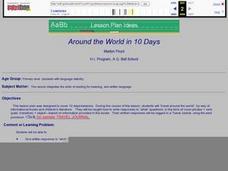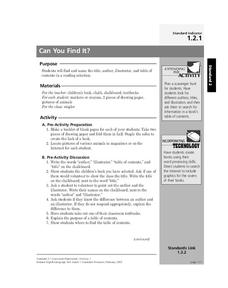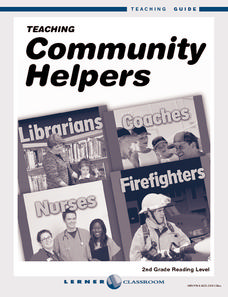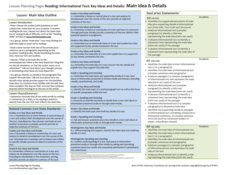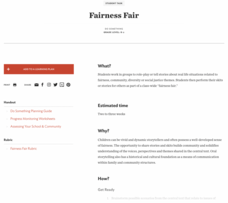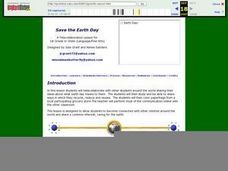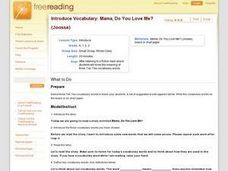Core Knowledge Foundation
A Time for All Seasons - Fall
The weather is cooling down and the leaves are starting to change color; fall is right around the corner. Celebrate this special time of year with this earth and life science lesson series that teaches children about the...
Core Knowledge Foundation
A Time for All Seasons - Summer
The sun is shining and the birds are singing, what better time to teach young learners about the fun season of summer. In this week-long science series, children learn how the rotation and orbit of the earth influence...
Core Knowledge Foundation
A Time for All Seasons - Winter
As the days get shorter and a chill enters the air, it's time to start teaching your little ones about the wondrous winter season. Through a series of teacher demonstrations, whole-class read alouds and discussions, and hands-on...
Curated OER
Around the World in 10 Days
Learners engage in producing responses to "what" questions and their written responses will be recorded in a Travel Journal. They produce their respones using a word processor. This lesson is very detailed and a rubic is included.
Teaching Tolerance
Musical Movement Showcase
Young performing artists create a song or choreograph a dance to illustrate a theme in a text they are reading. Step-by-step directions are included.
Curated OER
Can You Find It?
Plan a Parts of a Book scavenger hunt. Begin by giving your young adventurers a book, and asking them to find the title, author, illustrator, and table of contents. After a discussion of the purpose of each of these items, class members...
Curated OER
Role Models
First graders identify heroes by researching their family history. In this personal heritage lesson, 1st graders define the term "hero" and the characteristics that represent it. Students research family resources and family trees in...
Curated OER
Introduce Vocabulary: "I Can't," Said the Ant (Cameron)
With both rhyme and a fun storyline, Polly Cameron's story "I Can't," Said the Ant is a useful resource for vocabulary in context. Emerging readers focus on five key words: cooperate, mend, nimble,...
Lerner Publishing
Living or Nonliving
It's alive! Or is it? Through a series of shared readings, whole class activities, and independent exercises children explore the difference between living and non-living things, creating a pair of printable books...
Lerner Publishing
Teaching Community Helpers
Youngsters discover who the leaders in their community are and what it means to build a community in this four-lesson unit.
Montclair Art Museum
Eric Carle: Animals and Friends
Celebrate Eric Carle’s beloved children’s books, especially those about animals. Teachers and readers alike engage in Carle’s books as they explore the art and color in each of his stories, and how these elements support comprehension.
For the Teachers
Main Idea Outline
Find the main idea in an informational text with a versatile lesson plan. Three levels of differentiation help you implement the strategy in any age or class level, based on the ability and objectives of your learners.
Dick Blick Art Materials
Natural Twig Journals
Connect science, art, and language arts with a nature-themed bookmaking project. Kids craft book covers, cut paper for pages, and learn how to bind their creations.
Teaching Tolerance
Fairness Fair
How can we create a more fair world? Chances are, class members have some ideas! After reading a text about fairness, individuals create skits around the ideas of fairness. Extend the learning and make their presentations a...
Curated OER
Plant Power
Here is an opportunity for your first graders to take a close look at plants: what they need to survive, how they grow, and the names of each plant part. The book, Corduroy's Garden is used to open the lesson. Then, youngsters utilize...
Monroe City Schools
Clouds! Clouds! Clouds!
Here is a beautiful lesson on clouds designed for your 1st graders. Learners study three different types of clouds. They construct drawings of cumulus, cirrus, and stratus clouds. The Cloud Book, by Tommie dePaola is used to...
Curated OER
Save the Earth Day
First graders tellacollaborate with other students around the world sharing their ideas about what earth day means to them. They share ways in which they recycle, reduce and reuse.
Curated OER
My Community Book
Young learners examine different places in their neighborhood using informational texts. First they identify a place that they like to play and predict if it will be in the nonfiction book Community at Play.They will share their favorite...
Curated OER
How Many Raisins?
Students study the concept of addition. They create verbal number stories with numbers from one to five. They draw a slice of bread with a line down the middle and cut the bread shapes out of a "slice of bread" and a handful of raisins,...
Curated OER
Introduce Vocabulary: Animal Action ABC
Explore the meanings of tier two vocabulary words. In small groups, young learners listen to a read-aloud story and evaluate new vocabulary words for their meaning.
Curated OER
Introduce Vocabulary: Franklin Goes to School
Young readers analyze tier two vocabulary words with Franklin's help! Learners explore new vocabulary words discovered while reading Franklin Goes to School. They record their new vocabulary words using a word journal or discovery chart.
Curated OER
Introduce Vocabulary: Mama, Do You Love Me?
Youngsters analyze tier two vocabulary words. Learners explore their comprehension of tier two vocabulary words found while reading Mama, Do You Love Me? and record their vocabulary using a word journal or discovery chart.
Curated OER
Introduce Vocabulary: A Day at the Apple Orchard (Faulkner and Krawsky)
If your class is reading A Day at the Apple Orchard by Megan Faulkner, be sure to use this guide for vocabulary in context. Go over the orchard-related terms (cycle, harvest, orchard, pollen, and ripen) before reading...
Curated OER
Introduce Vocabulary: A Picture Book of Abe Lincoln (Adler)
The story of Abe Lincoln serves as the backdrop to this vocabulary-in-context activity as you read David Adler's A Picture Book of Abraham Lincoln. Scholars learn these politically themed words before listening to you read the story...



